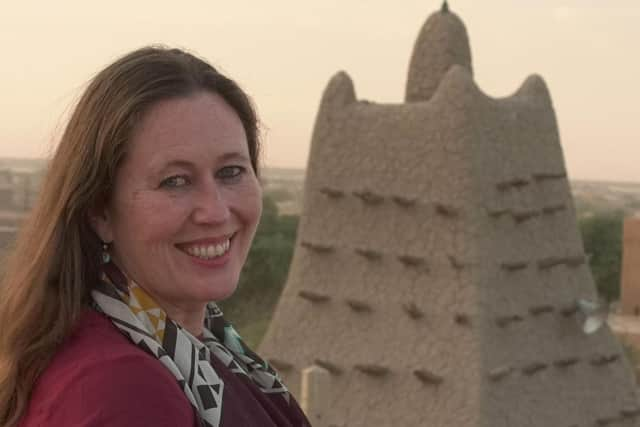Ex Scottish BBC editor gives up career to see climate change
Alice Morrison, from Edinburgh, built up her own media company after she left the Beeb.
But six years ago the 56-year-old travelled to Morocco for the first time and fell in love with the country - and the same year she upped sticks to the village of Imlil in the Atlas mountains.
Advertisement
Hide AdAdvertisement
Hide AdAlice, who does not have children and is single, speaks Arabic as well as Berber, the local language.


In March last year she became the first woman to walk the length of Morocco's Draa River.
And in her latest adventure, she trekked the length of the Western Sahara, a journey of more than 700 miles, over 79 days - which she has just completed.
Accompanied by three guides and five camels, Alice set out from the small coastal town of Oued Chbika on November 26 last year - undertaking an epic three month journey through the world's largest hot desert.
On February 12 she reached Guerguerat on the Mauritanian border, after close to three months of trekking 713 miles through sandstorms and baking hot desert heat, with temperatures reaching nearly 40°C.
She was determined to see the effects of climate change - which has caused the Sahara to expand by ten per cent in the past century.
Alice said: "I wanted to know what's happening with climate change.
"The Sahara's grown by ten per cent in the past 100 years and I wanted to see it with my own eyes what's happening to wildlife, vegetation and the people that live there.
Advertisement
Hide AdAdvertisement
Hide Ad"I wanted to do an old fashioned exploration of a hostile environment.
"We walked the whole way and the camels carried water."
They trekked around 13 miles most days, the equivalent of a half marathon, through scorching conditions.
The group regularly stopped off at remote desert settlements to speak to nomads and replenish their water supplies, which was in short supply for most of the trip.
Alice said: "Walking through sand is a nightmare and a landscape where there's nothing to look at with a sand storm in your face.
"You feel like you're walking on top of the globe.
"You can just see the curvature of the blue sky.
"There was one day when I only saw a tree then another just a spider.
"You do get slightly crazed."
And she believes her group would have perished from dehydration in the sparse desert had it not been for the kindness of locals.
Alice said: "People have always lived there, so there's always been some water in natural wells.
"The people who live there are camel herding nomads.
"They live off their milk and their meat.
"But there's been no really good rain since 2014.
"You'd be walking through spiky thorns which were seeds.
"The earth is waiting for the rain but it doesn't come.
"The people that live there have adapted.
"They truck their water in and fill enormous plastic bags containing 10 metric tonnes of water and they use them to feed there camels and sheep.
Advertisement
Hide AdAdvertisement
Hide Ad"They also herd their animals by motorbike and use GPS to combat the Sahara as the wells are drying up.
"We were met with great hospitality.
"We would've died if they hadn't given us water.
"There was often no water source for ten days.
"We were relying on the generosity of the people we met."
She first visited Morocco in 2014 when she competed in the gruelling 156 mile Marathon des Sables - known as the toughest foot race on earth.
After completing six marathons in six days through the Sahara, she decided to explore more of the country and eventually decided to move there permanently.
Alice, who has also lived in Uganda and Ghana, said: "There's always something to explore as the world's always changing.
"I want to see things others have missed and report back.
"We were doing what people did centuries ago - it's important to keep that perspective."